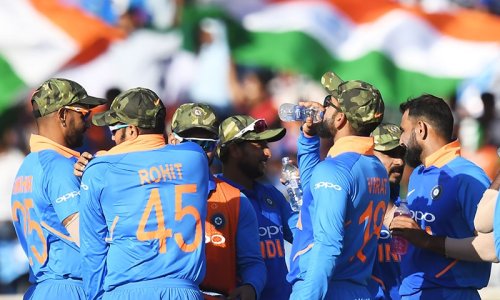No shame left...
From Wickets to Warfare
Sushant Singh is a lecturer in South Asian studies at Yale University and consulting editor with
The Caravan magazine in India. He served in the Indian Army for more than two decades.
In
War Minus the Shooting, his classic account of the 1996 World Cup, Mike Marqusee warned about the potential for cricket in South Asia to become ‘mimic warfare’ - a spectacle where geopolitical tensions replace athletic celebration, and stadium cheers morph into nationalist chants. There has seldom been such an exemplification of the plan by the Board of Control for Cricket in India to dedicate the closing ceremony of the Indian Premier League to the claimed success of Operation Sindoor - the Indian military response to the Pehelgum attacks.
Cricket Et Al is a reader-supported publication. To receive new posts and support my work, consider becoming a free or paid subscriber.
Top of Form
Bottom of Form
Cricket, Marqusee wrote, had the potential in the region to be a unifying cultural force; it could equally be deployed to "stoke the embers of division under the guise of sporting passion". The BCCI, increasingly the cricket arm of the BJP, is determined take the second option, transforming a celebration of sporting excellence into a platform for martial glorification with military chiefs in attendance. When BCCI secretary Devajit Saikia states that "while cricket remains a national passion, there is nothing greater than the nation and its sovereignty, integrity and security", he is acting not as the administrator of an inclusive, friendly and non-violent sport but as a propagandist, subordinating cricket to Hindutva’s political and military agendas.
The timing is particularly cynical, coming after the IPL was suspended due to India-Pakistan tensions where numerous foreign players experiencing panic over their safety. Rather than learning from this disruption and maintaining cricket's independence from geopolitical conflicts, the BCCI has doubled down, with a financial donation to the armed forces and the assent of various cricket worthies.
This can be directly attributed to the BJP’s deepening influence over Indian cricket administration, which is exemplified by key figures like BCCI secretary Devajit Saikia, a close ally of Assam BJP Chief Minister Himanta Biswa Sarma, and former BCCI chief Anurag Thakur, a BJP MP who used incendiary slogans as a union minister during an election campaign. These ties have aggravated the politicisation of cricket, aligning Indian cricket with the BJP’s ultra-nationalist agenda to further Narendra Modi’s political goals.
This fusion of sport and militarism extends to players: MS Dhoni, an honorary territorial army officer, sparked controversy in 2019 by wearing gloves bearing the Parachute Regiment’s “Balidan” dagger insignia during the World Cup, which the ICC initially banned before permitting a modified version. The ICC’s poor enforcement, allowing Dhoni’s regiment-themed gloves after political pressure and greenlighting the Indian team’s military-style caps in 2019, reveals how cricketing norms bend under nationalist narratives promoted by the BJP’s BCCI administrators.
The rules of the International Cricket Council explicitly state that cricket boards must manage affairs "autonomously" and "ensure that there is no government interference in its governance". But the International Cricket Council of course, currently chaired by Jay Shah, son of the union home minister Amit Shah. With ICC’s complicity, this militarisation sets an alarming precedent that could fundamentally alter how cricket and other sports operate globally. If cricket boards begin routinely honouring military operations during tournaments, it creates expectations for similar displays during future conflicts.
The move also risks cricket becoming a casualty of diplomatic tensions. Pakistani players and fans, already facing visa restrictions and discrimination in Indian cricket contexts, will likely view this as further evidence of cricket being weaponised against them. This undermines cricket's potential role as a bridge-building mechanism between unfriendly nations. It is a role cricket has successfully played between India and Pakistan numerous times in the past.
Far more sinister is the fact that the BCCI's decision exploits genuine public sentiment about the military for commercial and political gain. The IPL, valued as the world's richest cricket league generating massive revenues, benefits from nationalist fervour that boosts viewership and engagement. By wrapping military tributes in the spectacle of cricket entertainment, the BCCI cynically commodifies patriotism even as it tries to appear virtuous. This fusion of entertainment and military glorification normalises warfare and makes military actions appear celebratory and entertaining, rather than sobering realities of death and devastation requiring serious reflection.
Finally, cricket's greatest strength lies in its ability to unite diverse populations around a shared passion for the game. The BCCI's decision fractures this unity by explicitly associating the sport with military actions that necessarily involve taking sides in geopolitical conflicts. This alienates not just Pakistani audiences but potentially other international cricket communities uncomfortable with cricket being used as a platform for military celebration. The precedent also raises questions about cricket boards' responsibilities during future conflicts. Should every military operation be honoured at cricket events? Should boards refuse to host matches during conflicts? These questions reveal how the BCCI's decision creates unnecessary complications for cricket's future governance.
The BCCI's invitation to military chiefs for the IPL final represents a fundamental misunderstanding of sport's proper role in modern society. Commercial cricket tournaments should remain spaces where pursuit of sporting excellence, not military operations, takes centrestage. This decision risks transforming cricket from a unifying force into a divisive political tool, ultimately diminishing both the sport's integrity and its capacity to bridge social, political and national divides.
This alignment of commercial cricket with military triumphalism exemplifies Marqusee's prescient critique of sports being co-opted to serve exclusionary nationalist agendas. The tragic paradox of the BCCI's decision is of a celebration masquerading as unity that deepens the very divisions cricket should overcome. As Marqusee himself observed in
War Minus the Shooting: "Cricket can be unifier or divider, symbol of solidarity or 'war minus the shooting.' It is up to us."
Sushant Singh on the IPL's militarisation of cricket

www.cricketetal.com









